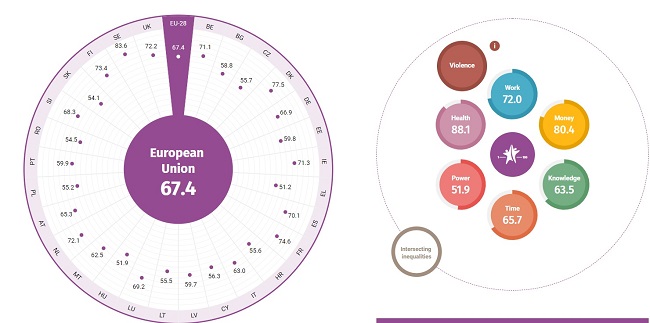Analytics, Estonia, Latvia, Lithuania, Society
International Internet Magazine. Baltic States news & analytics
Friday, 12.12.2025, 19:59
Estonia ranks 17th in EU for gender equality
 Print version
Print versionEstonia ranks 17th among the 28 member states of the European Union, having risen by three points over the course of two years, the Ministry of Social Affairs said. While Estonia's score exceeds those of Latvia and Lithuania, it is nonetheless lower than the average in the EU.
Altogether 25% of women in Estonia are employed in education, healthcare or social work, whereas the share of men in these fields is four percent. Meanwhile, 40% of men work in engineering, science, technology and mathematics, whereas the corresponding share among women in the said areas is 10%.
While the domain of power, or equality in decision-making processes, has seen the most progress both in Estonia and the European Union, it nonetheless remains the lowest scoring area. Gender equality pertaining to participation in political decision-making has notably increased compared with 2005, however, both on the parliamentary level as well as in the government.
Men and women were on average represented equally from 2016 to 2018 in agencies wielding social power in Estonia, such as the management board of the public broadcaster, which placed Estonia second among the EU member states. However, women only accounted for 14% among members in organizations engaged in making decision over research funding and for 9% of the executive committee of the Estonian Olympic Committee.
"It is positive that the level of income of both women and men has risen; however, the gender pay gap in Estonia remains one of the largest in Europe," Minister of Social Affairs Tanel Kiik said. "The distribution of jobs is definitely one of the reasons -- there are deeply rooted stereotypes in the society about which jobs are suitable for men and women. Changing that is dependent on more women studying information and communication technologies or science and engineering. More men, on the other hand, could study and take up employment in care and education," he said.
The minister noted that public policies, attitudes in the society, organizational practices and personal choices all have a role to play in changing the situation.
"A wide pay gap and the resulting pension gap place women in larger risk of poverty," he said.
The report also examines reconciling professional and family life and highlights as positive Estonia's parental leave system, which, unlike most systems in the European Union, neither depends on the parent's gender nor status or type of employment. The burden of care for elderly and disabled relatives, however, more often falls on women than men also compared with the average in the European Union.
The Gender Equality Index has six core domains -- work, money, knowledge, time, power and health.
Sweden continues to top the EU scoreboard, with 83.6 points, followed by Denmark with 77.5. Greece and Hungary have the most ground to make up, with both scoring less than 52.

Latvia ranks 18th in latest European Gender Equality Index
In the latest European Gender Equality Index, Latvia ranks 18th out of 28 European Union member countries, ahead of Lithuania but one position behind Estonia.
In the European Institute for Gender Equality's latest index, Latvia has a score of 59.7 points, which is 7.7 points lower than the EU average. From 2005 to 2017, Latvia's score has increased by 6.3 points, and Latvia has been moving faster than the EU average toward gender equality, the institute said.
Compared to the previous index published two years ago, Latvia has gone one place down in the index. In 2005, Latvia ranked 18th in the index.
Latvia's scores are lower than the EU's scores in all domains, except for the domains of time and work.
Gender inequalities are most pronounced in the domains of power (44.1 points) and knowledge (49.7 points). Latvia ranks last in the domain of knowledge.
Latvia achieves its highest scores in the domains of health (78.3 points) and work (74.2 points). Latvia ranks 26th in the domain of health in the EU. Its ranking is better in the domain of work, coming eighth in the EU. Since 2005, Latvia's scores have improved the most in the domains of power (+ 9.3 points) and money (+ 9.2 points). Progress has been slower in the domains of work (+ 2.5 points) and knowledge (+3.1 points).
Lithuania drops to 23rd place on EU's Gender Equality Index
Lithuania fell to number 23 among the EU's 28 member states in the latest ranking by the European Institute for Gender Equality (EIGE), down from 19th place two years ago.
On the 2019 Gender Equality Index released on Tuesday, Lithuania only fares better than Greece, Hungary, Slovakia, Romania and Poland.
Lithuania scored 55.5 out of 100 points, which is almost 12 points lower than the EU's average score.
"Between 2005 and 2017, progress towards gender equality did not improve in Lithuania; its score decreased by 0.3 points (- 1.3 points since 2015)," EIGE said in the report.
"Lithuania is progressing towards gender equality at a slower pace than other member states. Lithuania's ranking is seven positions lower than in 2005," it said.








 «The Baltic Course» Is Sold and Stays in Business!
«The Baltic Course» Is Sold and Stays in Business!

